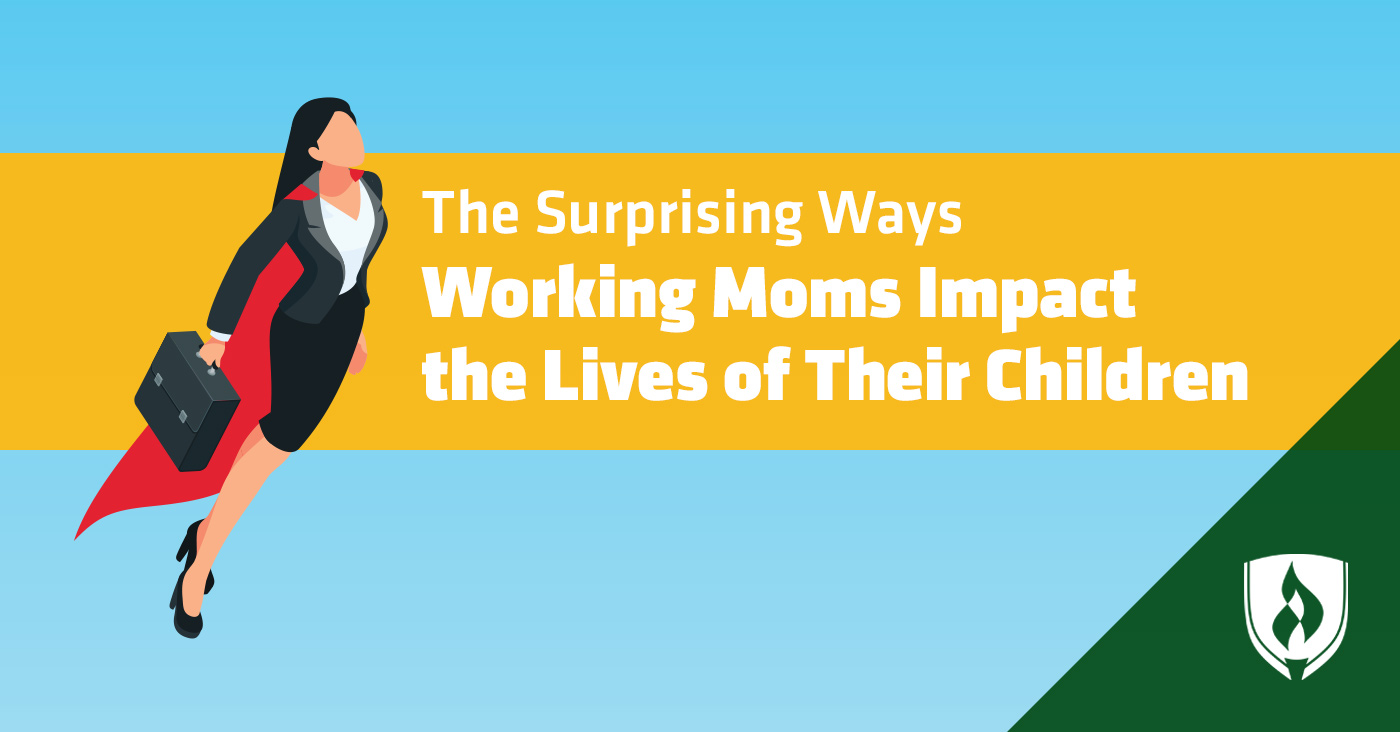Nearly all pregnant mothers in the U.S. are faced with the same dilemma: Once the baby is born, will you return to work or will you stay home? While many may assume each woman’s answer to this pivotal question is a matter of personal preference, there is so much more that goes into this important decision.

Some families can’t afford a stay-at-home option for either parent. Others have a hard time meeting climbing childcare costs and simply can’t afford for both parents to go back to work after a new baby is born. These matters can get even more complicated and challenging in a single-parent household.
But even in cases where the financial piece of the puzzle is taken care of, maternal employment—particularly when the children are young—is often surrounded by conversations discussing the potential impact of a child’s separation from its mother during their formative years.
From looming financial burdens to anxiety in attempting to achieve the ideal environment for peak child development, it often seems as if there is no favorable option for working mothers. Because there is no one-size-fits-all solution, we dug into the stats and spoke to experienced working mothers to get additional insight into the impact of maternal employment on children. Take a look at what we found.
The facts about mothers in the workforce
Let’s first take a look at the state of parental leave offerings. In Europe, both the mother and the father of a new baby are entitled to at least four months of paid parental leave, with many countries mandating companies to offer even more. Further, if employees request temporary changes to their working hours upon their return, companies are “Obliged to give this request due consideration and make a sound business case for any refusal.”
In fact, the U.S. is the only developed country that doesn’t mandate paid maternity leave from all employers. Much of the research on the topic indicates that families could benefit from improved paternal leave policies that would allow both mothers and fathers to stay home with infants longer without sacrificing income or job security.
However, once the up-to-12 weeks of unpaid leave Americans are eligible for run out, the statistics suggest that most modern-day mothers are returning to work. Consider the following findings from the U.S. Department of Labor:1
- There are currently 25.1 million working mothers of children under 18 in the U.S.
- In 2015, 69.9 percent of mothers with children younger than 18 were in the labor force, compared to just 47.4 percent in 1975.
- Between 1975 and 2015, the labor force participation rate of mothers with children under three years increased by 27.1 percent.
- On average, employed mothers spend more time caring for and helping household children than employed fathers.
According to Pew Research Center data, it’s also statistically true that women are more commonly the ones who adjust their schedules and make compromises when the needs of children collide with work. In fact, women represent nearly half of the U.S. workforce, yet they devote significantly more time than men on average to things like housework and childcare. Consider the following as it relates to working parents of children younger than 18:2
- Mothers spent an average of 14.2 hours per week on housework, compared to 8.6 hours for fathers.
- Mothers spent an average of 10.7 hours per week actively engaged in childcare, compared to 7.2 hours for fathers.
- 42 percent of mothers with previous work experience reported having to reduce their work hours to care for a child or other family member at some point in their career, while just 28 percent of fathers said the same.
- Women who did take time off at some point were twice as likely as men who did the same to say that it hurt their career overall.
How are children influenced by working mothers?
Some believe that maternal employment during a child’s early years would result in long-term developmental consequences. But the research regarding this belief is mixed. For example, one analysis found that children of women who return to work before their kids turn three are no more likely to act out or fail at school than kids raised by stay-at-home mothers.3
It’s true that, in many cases, the supplemental income earned by working mothers can help maintain or improve a child’s quality of life when it comes to the ability to provide children with more nutritious food and better housing. But it’s also true that having an employed mother can result in certain psycho-social benefits for children.
When kids have the opportunity to see their mothers succeed in the professional world, they are inspired to do the same. “Children follow in their parents’ footsteps,” explains Hamna Amjad, community manager at Ridester and full-time working mother. “When they see you pursuing your dreams and working hard for them, it gives them a very strong message and inspires them.” She adds that the sense of achievement and fulfillment she gets from her work in turn makes her a happier parent—something that creates a positive ripple effect as it reaches her children.
Another research study that considered family and career data on more than 100,000 men and women from around the world found that women who grew up with working mothers are more likely to have careers themselves than those whose mothers stayed home. Those same women are also more likely to have better, higher-paying jobs. In fact, daughters of working mothers make about 23 percent more than daughters of stay-at-home moms.4
Teresa Kay-Aba Kennedy, president and CEO of Power Living Enterprises, grew up watching her mother run her own international marketing consulting company. While Kennedy observed her mom working from her at-home office, she learned crucial lessons about fortitude and independence. “She showed me by example what was possible as a female entrepreneur—make your dreams come true by believing in yourself, living your values, pursuing your vision, working smart and always seeking joy along the way,” Kennedy says.
She maintains that witnessing her mother’s professional commitment and dedication to excellence had a profound effect on her own professional journey. Now an entrepreneur herself, Kennedy and her mother have written two award-winning books together.
It’s worth considering that the positive findings regarding the children of working mothers aren’t limited to daughters. Research has also determined that sons of working mothers are not only more likely to eventually have a wife who works, but they also spend about eight more hours per week caring for their kids and doing household chores than sons of mothers who stay home.
At the root of these findings is the notion that children internalize the behaviors and social attitudes modeled by the adults in their lives.
Are you cut out to be a working mother?
According to a survey conducted by Pew Research, approximately 72 percent of surveyed Americans reject the notion that women should return to their “traditional role” in society, forfeiting professional success to raise kids full-time.2 Yet just 16 percent agreed that having a mother who works full-time is the ideal situation for young children—42 percent supported mothers working part-time, and 33 percent supported mothers not working at all.2
With that in mind, it’s understandable if you’re conflicted about becoming a working mother. Ultimately, a lot of this decision comes down to the cards life deals you. Those who choose to enter the workforce as mothers can take solace in that there is evidence children are not only unharmed by maternal employment, but they can actually benefit from it in numerous ways. After rearranging her professional life to be more available for her son, Dr. Maiysha T. Clairborne concludes that “In the end, it’s not the mom working specifically that impacts the child—it’s whether the working mother has the ability and capacity to create balance so that she can be there for her children in a way that works for her and her family.”
If you choose to set aside your “mom guilt” and chase your career dreams, Dr. Clairborne lists the following as crucial for achieving that balance: awareness, skilled communication, organization and a wiliness to ask for support when needed.
While there is no one-size-fits-all career that is ideal for moms, there are a number of avenues that lend themselves toward that work-life balance you’re hoping to achieve. You can learn more by visiting our article, “6 Best Jobs for Moms: Balancing Family and Full-Time Work.”
1Women’s Bureau, U.S. Department of Labor, Working Mothers Issue Brief, [information accessed 10/24/2018] https://www.dol.gov/wb/resources/WB_WorkingMothers_508_FinalJune13.pdf
2Pew Research Center, Fact Tank: News in the Numbers, Women More than Men Adjust Their Careers for Family Life, [information accessed 10/24/2018] https://www.pewresearch.org/fact-tank/2015/10/01/women-more-than-men-adjust-their-careers-for-family-life/
3Goldberg, Lucas-Thompson, Prause, American Psychological Association, Psychological Bulletin 2010 Vol. 136 No. 6, Maternal Work Early in the Lives of Children and Its Distal Associations With Achievement and Behavior Problems: A Meta-Analysis, [information accessed 10/24/2018] https://www.apa.org/pubs/journals/releases/bul-136-6-915.pdf
4McGinn, Castro & Lingo, British Sociological Association, Work, Employment and Society, Learning from Mum: Cross-National Evidence Linking Maternal Employment and Adult Children’s Outcomes [information accessed 10/24/2018] https://journals.sagepub.com/doi/abs/10.1177/0950017018760167




